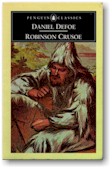 |
Review
by Edward Tanguay January 6, 1998 |
"Robinson Crusoe is an adventure story, it is also a moral tale, a commercial accounting, and a puritan fable."
It starts as a moral tale: Robinson defies his father's advice, gets in lots of trouble, gets enslaved, makes the best of it, gets shipwrecked, makes the best of it, learns and grows from his experiences, wrestles with his soul, and ends up happy and successful back on the mainland.
And this book has a strange economic undertone. It has that strange 18th-century belief that God, morality and economics are all somehow one. To conquer a North American people, reduce them to slavery, make them mine gold and become rich and successful in the Old World somehow was moral, economically sound, and pleased God all at once. This is the kind of thinking that Defoe seems to have running in the back of his mind in this book. From this Defoe makes interesting realizations, for instance, the value (or non-value) of his money when he is alone on the island, and then the return of its value when he gets back to the mainland.
For as to the money, I had no manner of occasion for it: 'twas to me as the dirt under my feet; and I would have given it all for three or four pair of english shoes and stockings, which were things I greatly wanted, but had not had on my feet now for many years.
I felt the journeys that he had before he got stranded on the island were important to his character. You felt that he was really going nowhere in life, was saved a couple times by the grace of God, but really had no importance to anyone. This makes his struggle for life on the island all the more poignant, it is not only a struggle for physical survival but for his life's meaning as well.
Defoe's writing sometimes has a dry smack to it: "immediately he sunk down into the water, but rose instantly and plunged up and down as if he was struggling for life; and so indeed he was." He has that 18th century mastery of the English language, similar to Fielding. It is pleasant reading. ("It was in vain to sit still and wish for what was not to be had, and this extremity rouzed my application.")
I actually enjoyed his slow but progressive recovery from his ship wreck and aweful condition of being on the island. Nothing really happens of interest and he is the only character, but you have a developing hope and progress that carries the story along. His wrestlings with his conscience even seem to put another character into the story.
My conscience presently checked me in that enquirey, as if I had blasphemed, and methought it spoke to me like a voice: "WRETCH! doest thou ask what thou hast done? Look back upon a dreadful misspent life, and ask they self what thou hast not done; ask, Why it it that thou wert not long ago destroyed?
He had a pleasant lack of reverence for God, for instance when he found that "God had miraculously caused this grain to grow without any help fo seed sown" and it "brought tears out of my eyes". Then he remembers that he had "shook a bag of chickens' meat out in that place, and then the wonder began to cease; and I must confess, my religious thankfulness to God's providence began to abate too." You can relate to Robinson. His emotions and thoughts seem real and honest.
The arrival of the savages on the island was well introduced: he only saw their footprint, but it instilled him with such a fear as to keep him furtively glancing at all times, kept him from sleeping, and generally ruined all peace and happiness he had enjoyed.
I was comparing the happy posture of my affairs in the first years of my habitation here, compared to the life of anxiety, fear, and care which I had lived ever since I had seen the pirnt of a foot in the sand.
Yet just has he took responsibility for his condition when he was shipwrecked and turned his situation into something positive, he takes the situation with the savages into his control as well, "I resolved, if possible, to get one of those savages into my hands, cost what it would." In this sense, this novel is a Bildungsroman, isn't it? You follow him as he struggles and grows and improves.
And even when he captures Friday and the various other men, he learns how to manage them and again becomes master of the situation.
The ending threw me. What were they doing hunting foxes and bears in Spain? (!)
When you think that full novels had not really come about back then, this is quite a unique piece of work just in that it is a novel. One of the must reads.
Edward Tanguay
Send your review on this book to The Online
Reading Club.
Check out the books we are currently reading.
Go the the Online Reading Club Home Page.
